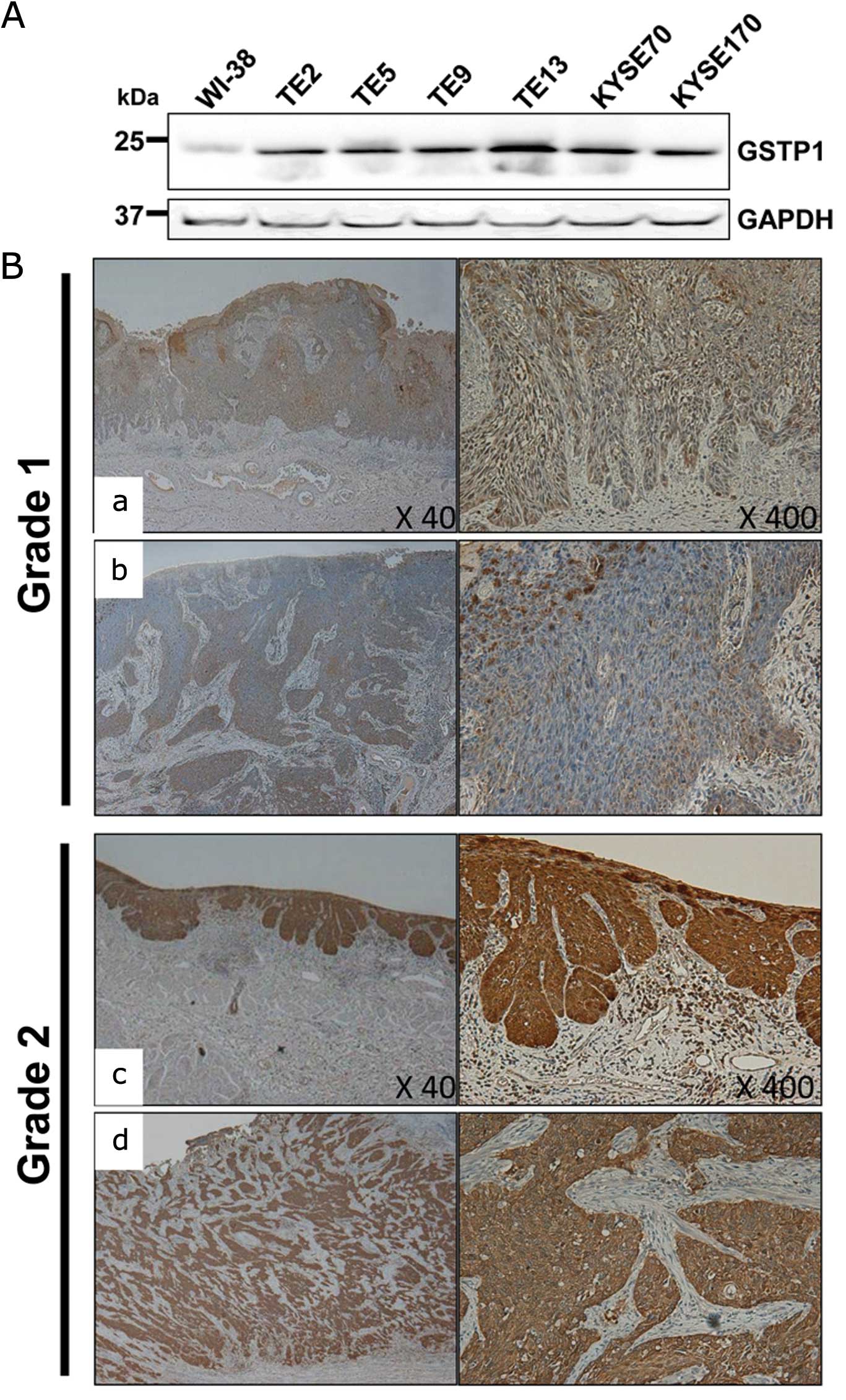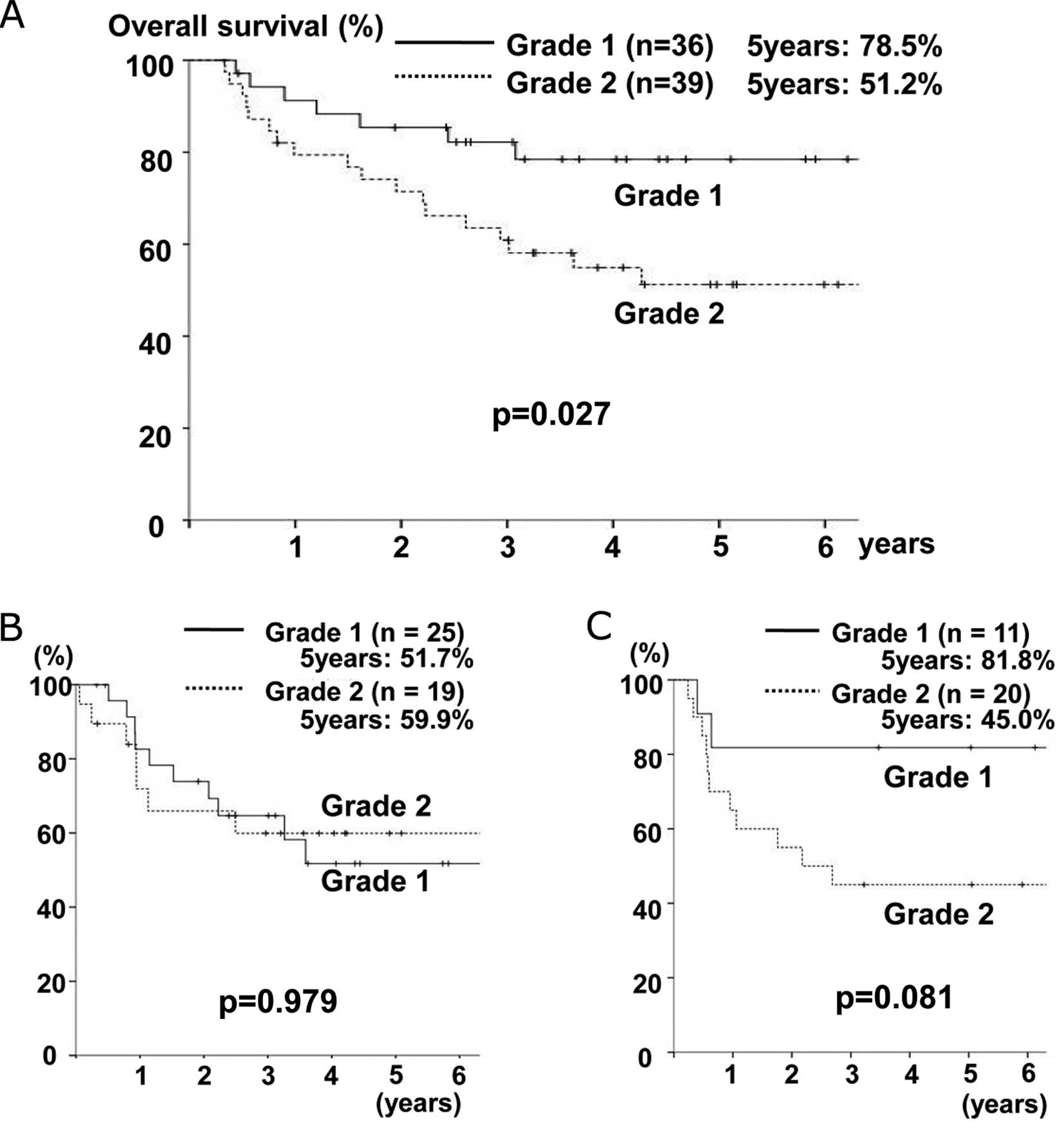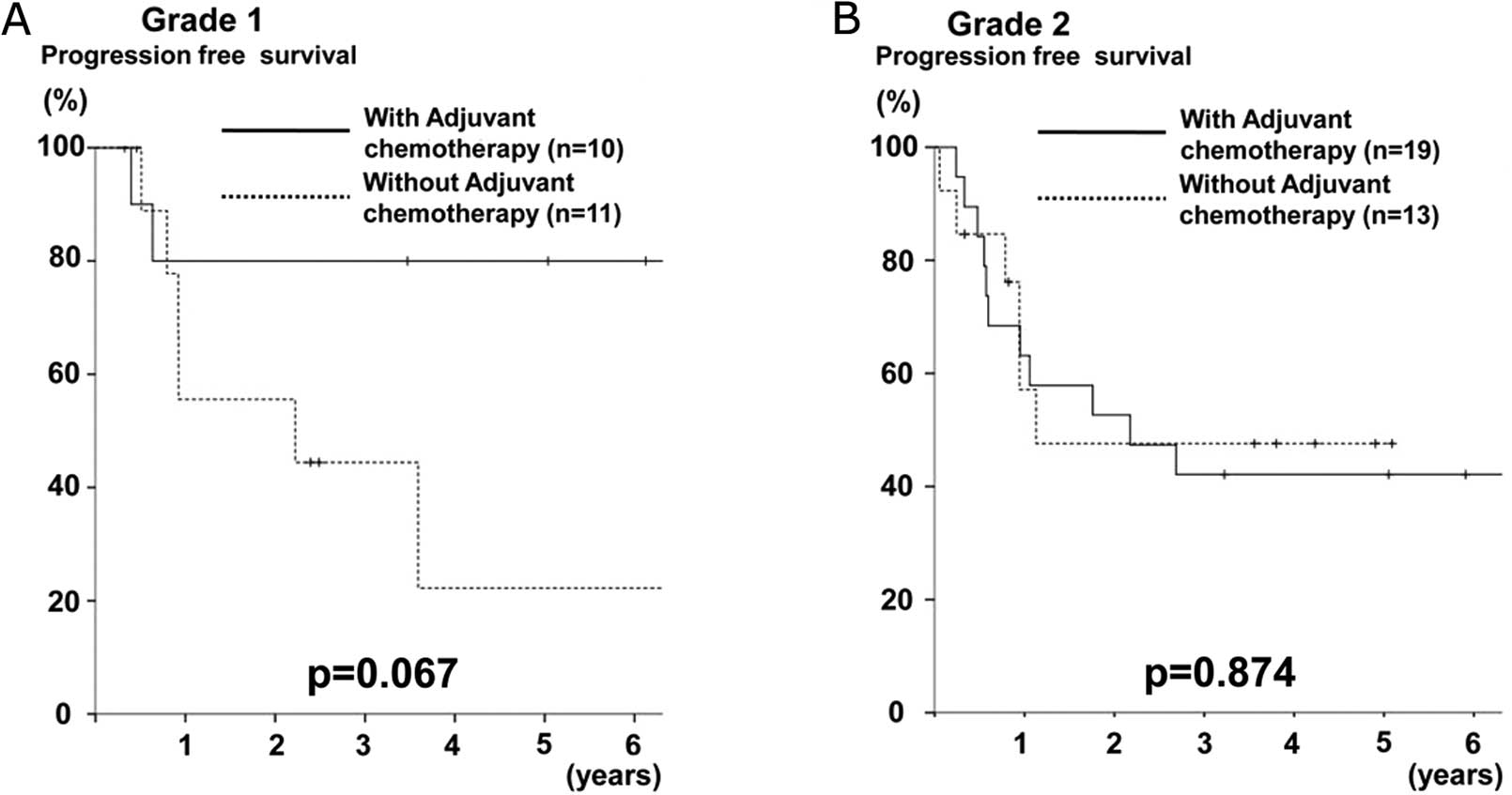|
1
|
Kamangar F, Dores GM and Anderson WF:
Patterns of cancer incidence, mortality, and prevalence across five
continents: defining priorities to reduce cancer disparities in
different geographic regions of the world. J Clin Oncol.
24:2137–2150. 2006. View Article : Google Scholar : PubMed/NCBI
|
|
2
|
De Vita F, Di Martino N, Orditura M,
Cosenza A, Galizia G, Del Genio A and Catalano G: Preoperative
chemoradiotherapy for squamous cell carcinoma and adenocarcinoma of
the esophagus: a phase II study. Chest. 122:1302–1308.
2002.PubMed/NCBI
|
|
3
|
Hofstetter W, Swisher SG, Correa AM, Hess
K, Putnam JB Jr, Ajani JA, Dolormente M, Francisco R, Komaki RR,
Lara A, Martin F, Rice DC, Sarabia AJ, Smythe WR, Vaporciyan AA,
Walsh GL and Roth JA: Treatment outcomes of resected esophageal
cancer. Ann Surg. 236:376–384. 2002. View Article : Google Scholar : PubMed/NCBI
|
|
4
|
Medical Research Council Oesophageal
Cancer Working Group. Surgical resection with or without
preoperative chemotherapy in oesophageal cancer: a randomised
controlled trial. Lancet. 359:1727–1733. 2002. View Article : Google Scholar : PubMed/NCBI
|
|
5
|
Cooper JS, Guo MD, Herskovic A, Macdonald
JS, Martenson JA Jr, Al-Sarraf M, Byhardt R, Russell AH, Beitler
JJ, Spencer S, Asbell SO, Graham MV and Leichman LL:
Chemoradiotherapy of locally advanced esophageal cancer: long-term
follow-up of a prospective randomized trial (RTOG 85–01). Radiation
Therapy Oncology Group. JAMA. 281:1623–1627. 1999.PubMed/NCBI
|
|
6
|
McKinney A, Sharp L, Macfarlane GJ and
Muir CS: Oesophageal and gastric cancer in Scotland 1960–90. Br J
Cancer. 71:411–415. 1995.
|
|
7
|
Ando N, Ozawa S, Kitagawa Y, Shinozawa Y
and Kitajima M: Improvement in the results of surgical treatment of
advanced squamous esophageal carcinoma during 15 consecutive years.
Ann Surg. 232:225–232. 2000.PubMed/NCBI
|
|
8
|
Coles BF and Kadlubar FF: Detoxification
of electrophilic compounds by glutathione S-transferase catalysis:
determinants of individual response to chemical carcinogens and
chemotherapeutic drugs? Biofactors. 17:115–130. 2003. View Article : Google Scholar
|
|
9
|
Matthias C, Jahnke V, Fryer AA and Strange
RC: Influence of glutathione s-transferase and cytochrome p450
polymorphisms on prognosis of head and neck cancer.
Laryngorhinootologie. 81:406–412. 2002.(In German).
|
|
10
|
Anderer G, Schrappe M, Brechlin AM, Lauten
M, Muti P, Welte K and Stanulla M: Polymorphisms within glutathione
S-transferase genes and initial response to glucocorticoids in
childhood acute lymphoblastic leukaemia. Pharmacogenetics.
10:715–726. 2000. View Article : Google Scholar
|
|
11
|
Stoehlmacher J, Park DJ, Zhang W, Groshen
S, Tsao-Wei DD, Yu MC and Lenz HJ: Association between glutathione
S-transferase P1, T1, and M1 genetic polymorphism and survival of
patients with metastatic colorectal cancer. J Natl Cancer Inst.
94:936–942. 2002. View Article : Google Scholar : PubMed/NCBI
|
|
12
|
Sweeney C, Ambrosone CB, Joseph L, Stone
A, Hutchins LF, Kadlubar FF and Coles BF: Association between a
glutathione S-transferase A1 promoter polymorphism and survival
after breast cancer treatment. Int J Cancer. 103:810–814. 2003.
View Article : Google Scholar : PubMed/NCBI
|
|
13
|
Lee JM, Wu MT, Lee YC, Yang SY, Chen JS,
Hsu HH, Huang PM, Kuo SW, Lee CJ and Chen CJ: Association of GSTP1
polymorphism and survival for esophageal cancer. Clin Cancer Res.
11:4749–4753. 2005. View Article : Google Scholar : PubMed/NCBI
|
|
14
|
Wang Z, He W, Yang G, Wang J, Wang Z,
Nesland JM, Holm R and Suo Z: Decreased expression of GST pi is
correlated with a poor prognosis in human esophageal squamous
carcinoma. BMC Cancer. 10:3522010. View Article : Google Scholar : PubMed/NCBI
|
|
15
|
Ueda Y, Shiozaki A, Itoi H, Okamoto K,
Fujiwara H, Ichikawa D, Kikuchi S, Fuji N, Itoh T, Ochiai T,
Komatsu S and Yamagishi H: Intraoperative pathological
investigation of recurrent nerve nodal metastasis can guide the
decision whether to perform cervical lymph node dissection in
thoracic esophageal cancer. Oncol Rep. 16:1061–1066. 2006.
|
|
16
|
Shiozaki A, Yamagishi H, Itoi H, Fujiwara
H, Kikuchi S, Okamoto K, Ichikawa D, Fuji N, Ochiai T, Sonoyama T
and Ueda Y: Long-term administration of low-dose cisplatin plus
5-fluorouracil prolongs the postoperative survival of patients with
esophageal cancer. Oncol Rep. 13:667–672. 2005.PubMed/NCBI
|
|
17
|
Sobin LH, Gospodarowicz MK and Wittekind
C: International Union Against Cancer. TNM Classification of
Malignant Tumours. 7th edition. Hoboken, NJ: Wiley-Blackwell; pp.
73–77. 2010
|
|
18
|
Kato H, Miyazaki T, Nakajima M, Fukuchi M,
Manda R and Kuwano H: Value of positron emission tomography in the
diagnosis of recurrent oesophageal carcinoma. Br J Surg.
91:1004–1009. 2004. View
Article : Google Scholar : PubMed/NCBI
|
|
19
|
Roedl JB, Harisinghani MG, Colen RR,
Fischman AJ, Blake MA, Mathisen DJ and Mueller PR: Assessment of
treatment response and recurrence in esophageal carcinoma based on
tumor length and standardized uptake value on positron emission
tomography-computed tomography. Ann Thorac Surg. 86:1131–1138.
2008. View Article : Google Scholar
|
|
20
|
Fleiss JL: Measuring nominal scale
agreement among many rates. Psychol Bull. 76:378–382. 1971.
View Article : Google Scholar
|
|
21
|
Nakajima T, Wang RS, Nimura Y, Pin YM, He
M, Vainio H, Murayama N, Aoyama T and Iida F: Expression of
cytochrome P450s and glutathione S-transferases in human esophagus
with squamous-cell carcinomas. Carcinogenesis. 17:1477–1481. 1996.
View Article : Google Scholar : PubMed/NCBI
|
|
22
|
Laborde E: Glutathione transferases as
mediators of signaling pathways involved in cell proliferation and
cell death. Cell Death Differ. 17:1373–1380. 2010. View Article : Google Scholar : PubMed/NCBI
|
|
23
|
Rossini A, Rapozo DC, Soares Lima SC,
Guimarães DP, Ferreira MA, Teixeira R, Kruel CD, Barros SG,
Andreollo NA, Acatauassú R, Matos HJ, Albano RM and Pinto LF:
Polymorphisms of GSTP1 and GSTT1, but not of CYP2A6, CYP2E1 or
GSTM1, modify the risk for esophageal cancer in a western
population. Carcinogenesis. 28:2537–2542. 2007. View Article : Google Scholar : PubMed/NCBI
|
|
24
|
Li D, Dandara C and Parker MI: The 341C/T
polymorphism in the GSTP1 gene is associated with increased risk of
oesophageal cancer. BMC Genet. 11:472010. View Article : Google Scholar : PubMed/NCBI
|
|
25
|
Peklak-Scott C, Smitherman PK, Townsend AJ
and Morrow CS: Role of glutathione S-transferase P1-1 in the
cellular detoxification of cisplatin. Mol Cancer Ther. 7:3247–3255.
2008. View Article : Google Scholar : PubMed/NCBI
|
|
26
|
Miyake T, Nakayama T, Naoi Y, Yamamoto N,
Otani Y, Kim SJ, Shimazu K, Shimomura A, Maruyama N, Tamaki Y and
Noguchi S: GSTP1 expression predicts poor pathological complete
response to neoadjuvant chemotherapy in ER-negative breast cancer.
Cancer Sci. 103:913–920. 2012. View Article : Google Scholar : PubMed/NCBI
|
|
27
|
Adler V, Yin Z, Fuchs SY, Benezra M,
Rosario L, Tew KD, Pincus MR, Sardana M, Henderson CJ, Wolf CR,
Davis RJ and Ronai Z: Regulation of JNK signaling by GSTp. EMBO J.
18:1321–1334. 1999. View Article : Google Scholar : PubMed/NCBI
|
|
28
|
Sau A, Filomeni G, Pezzola S, D’Aguanno S,
Tregno FP, Urbani A, Serra M, Pasello M, Picci P, Federici G and
Caccuri AM: Targeting GSTP1-1 induces JNK activation and leads to
apoptosis in cisplatin-sensitive and -resistant human osteosarcoma
cell lines. Mol Biosyst. 8:994–1006. 2012. View Article : Google Scholar : PubMed/NCBI
|
|
29
|
Hu Y, Ju Y, Lin D, Wang Z, Huang Y, Zhang
S, Wu C and Jiao S: Mutation of the Nrf2 gene in non-small cell
lung cancer. Mol Biol Rep. 39:4743–4747. 2012. View Article : Google Scholar : PubMed/NCBI
|
|
30
|
Kim YR, Oh JE, Kim MS, Kang MR, Park SW,
Han JY, Eom HS, Yoo NJ and Lee SH: Oncogenic NRF2 mutations in
squamous cell carcinomas of oesophagus and skin. J Pathol.
220:446–451. 2010. View Article : Google Scholar : PubMed/NCBI
|
|
31
|
Shibata T, Kokubu A, Saito S,
Narisawa-Saito M, Sasaki H, Aoyagi K, Yoshimatsu Y, Tachimori Y,
Kushima R, Kiyono T and Yamamoto M: NRF2 mutation confers malignant
potential and resistance to chemoradiation therapy in advanced
esophageal squamous cancer. Neoplasia. 13:864–873. 2011.PubMed/NCBI
|
|
32
|
Ando N, Kato H, Igaki H, Shinoda M, Ozawa
S, Shimizu H, Nakamura T, Yabusaki H, Aoyama N, Kurita A, Ikeda K,
Kanda T, Tsujinaka T, Nakamura K and Fukuda H: A randomized trial
comparing postoperative adjuvant chemotherapy with cisplatin and
5-fluorouracil versus preoperative chemotherapy for localized
advanced squamous cell carcinoma of the thoracic esophagus
(JCOG9907). Ann Surg Oncol. 19:68–74. 2012. View Article : Google Scholar
|

















